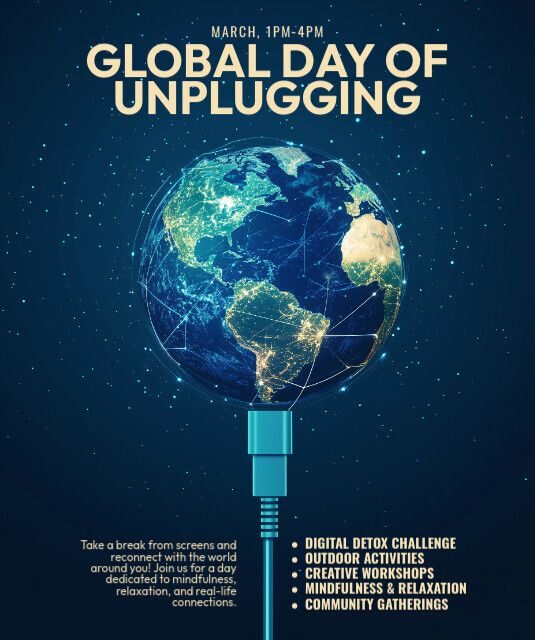🔌 Global Day of Unplugging: 7 Life-Changing Benefits of Disconnecting to Reconnect
Observed On: First Friday of March (March 7 in 2025)
Theme: Disconnect to Reconnect
- 📜 History of Global Day of Unplugging
- 📅 Timeline of Key Events
- 📊 7 Fascinating Facts About GDU and Digital Detox
- 🎯 Why It Matters: Significance of Global Day of Unplugging
- 📱 Observance: How People Participate
- 🙋 FAQs about Global Day of Unplugging
- Q1. When is the Global Day of Unplugging celebrated?
- Q2. Is it a religious holiday?
- Q3. Can businesses participate?
- Q4. What if I need to stay connected for emergencies?
- Q5. Is there a minimum duration for unplugging?
- 🎉 Wishing Messages for the Global Day of Unplugging
- ✅ Benefits of Participating in Global Day of Unplugging
- 🌍 Why It’s Important to Society
- 💥 Key Points to Remember
- 🧠 Real-Life Examples
- 🌈 In Daily Life: Practical Ways to Unplug
- 🔚 Conclusion: Rebooting for Real Life
In an age where screens dominate our days and nights, the Global Day of Unplugging (GDU) invites us to pause, breathe, and live offline—if only for 24 hours. This observance is a powerful reminder of the benefits of putting down our devices to reclaim what really matters: real conversations, mindfulness, creativity, rest, and relationships.
📜 History of Global Day of Unplugging
The Global Day of Unplugging was initiated by Reboot, a Jewish arts and culture non-profit, around 2010, as part of their “Sabbath Manifesto” project. The idea was to reclaim the ancient ritual of the Sabbath—a time for reflection, rest, and disconnection.
What started as a niche cultural initiative has now evolved into a global digital wellness movement, attracting people of all backgrounds, faiths, and ages.
📅 Timeline of Key Events
| Year | Event |
|---|---|
| 2010 | First observance of Global Day of Unplugging by Reboot |
| 2012 | Thousands join the movement; media coverage expands |
| 2016 | Tech-free zones and public unplugging events start |
| 2020 | COVID-19 lockdowns increase screen time, renewing urgency of digital detox |
| 2024 | Global observance includes 50+ countries with school and corporate participation |
| 2025 (Mar 7) | Next Global Day of Unplugging |
📊 7 Fascinating Facts About GDU and Digital Detox
📵 The average person touches their phone 2,617 times a day.
⌛ Most adults spend over 7 hours daily on screens.
🌍 GDU is now observed in over 50 countries.
🧠 People who take breaks from devices report better mental clarity and improved sleep.
❤️ Families who unplug together report higher relationship satisfaction.
🧘♀️ A 24-hour unplug can reduce stress levels by up to 30%.
🗓️ GDU inspired similar movements like Digital Detox Week, Screen-Free Week, and Tech-Free Tuesdays.
🎯 Why It Matters: Significance of Global Day of Unplugging
We live in the digital age—always connected but often emotionally distant. The Global Day of Unplugging encourages people to:
Reclaim presence in the physical world
Deepen human relationships
Rediscover hobbies and creativity
Sleep better and lower anxiety
Be intentional with tech usage
It’s not about anti-technology—it’s about rebalancing.
📱 Observance: How People Participate
💡 Individuals:
Turn off phones and Wi-Fi for 24 hours
Engage in art, reading, music, walking, cooking
Practice meditation or journaling
Reconnect with nature
👨👩👧 Families:
Plan a device-free dinner or picnic
Play board games or tell stories
Start a no-screen tradition
🏢 Workplaces:
Encourage email-free hours
Offer mindfulness workshops
Organize unplugged retreats
🏫 Schools:
Host unplugged classroom activities
Assign creative, screen-free homework
Educate on digital wellbeing
🙋 FAQs about Global Day of Unplugging
Q1. When is the Global Day of Unplugging celebrated?
It’s observed on the first Friday of March, starting at sundown, lasting 24 hours.
Q2. Is it a religious holiday?
No. While it was inspired by Shabbat traditions, GDU is now celebrated secularly and globally.
Q3. Can businesses participate?
Yes. Many workplaces now join the observance to improve employee wellness and productivity.
Q4. What if I need to stay connected for emergencies?
That’s okay. GDU is about intentional disconnection, not reckless withdrawal. You can unplug selectively.
Q5. Is there a minimum duration for unplugging?
Even a 1-hour detox can yield mental clarity. But ideally, 24 hours is the goal.
🎉 Wishing Messages for the Global Day of Unplugging
🕊️ “Take a break from the buzz—reconnect with the beauty of now. Happy Global Day of Unplugging!”
💚 “Disconnect to reconnect—with yourself, your family, and the world around you.”
🌿 “May this day remind you that your worth isn’t measured in likes or notifications.”
✨ “A peaceful mind starts with a powered-down device. Wishing you serenity on this tech-free day!”
🔌 “Happy Global Day of Unplugging! Let silence recharge your soul.”
✅ Benefits of Participating in Global Day of Unplugging
🔹 Improved Sleep:
Less blue light = better melatonin production = deeper sleep.
🔹 Stronger Relationships:
Face-to-face interactions build empathy and trust.
🔹 Mental Clarity:
Silence and space breed reflection, creativity, and calm.
🔹 Physical Wellness:
More time for walking, stretching, or hobbies.
🔹 Emotional Reset:
Reduced digital noise means less stress and comparison.
🌍 Why It’s Important to Society
In a world flooded with digital content, Global Day of Unplugging is society’s pause button. Here’s why it matters at the community level:
Mental Health Awareness: Reduces burnout, anxiety, and information overload
Family Bonding: Encourages parents and children to engage meaningfully
Work-Life Balance: Promotes healthier boundaries between career and personal life
Mindful Tech Use: Advocates digital minimalism and conscious consumption
Environmental Impact: Less screen time = reduced power use (marginal, but symbolic)
💥 Key Points to Remember
Global Day of Unplugging happens every first Friday of March
Encourages a 24-hour digital detox
Supports mental, emotional, physical, and social wellness
Originated from Reboot’s “Sabbath Manifesto”
Is non-religious and inclusive
Grows globally with each year, across schools, homes, and companies
🧠 Real-Life Examples
Sarah, a working mom from New York, noticed improved communication with her kids after three unplugged Fridays.
A small café in Sydney launched an “Unplugged Hour” every Sunday, increasing customer connection.
A tech firm in Berlin found that post-GDU productivity rose by 18% as employees felt more rested.
🌈 In Daily Life: Practical Ways to Unplug
Use airplane mode during meals
Keep phones out of the bedroom
Set a “no screens after 9 PM” rule
Create a tech basket during family time
Replace phone scrolling with journaling or sketching
🔚 Conclusion: Rebooting for Real Life
We plug in all day—but how often do we plug into ourselves?
The Global Day of Unplugging isn’t about rejecting technology; it’s about embracing balance, authenticity, and joy. Even one day offline can shift our perspective, energize our bodies, and remind us of what truly matters.
“May your notifications pause, but your presence come alive.”








